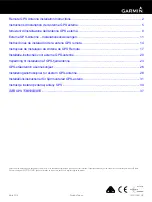
A.H. Systems AK-571-4 Horn Antenna Kit
ANTENNA FORMULAS AND CALCULATIONS
EMISSIONS TESTING
Individual calibration data for the log periodic antenna is supplied at appropriate
distances (3, and 10 meter) to comply with various emissions test requirements.
For emissions measurements, add antenna factor plus cable loss to receiver
reading in dB
V to convert to field strength in dB
V/meter.
Field Strength(dBuV/m) = SA(dBuV) + AF(dB/m) + cable loss (dB)
SA = Spectrum Analyzer or Receiver voltage reading
AF = Antenna Correction Factor
CL = Cable Loss in dB
IMMUNITY TESTING
For Immunity measurements, the generated electric field strength can be
calculated by:
FS = Approximate Field Strength in (V/m)
P = Power in watts
g = Numeric Gain
d = Distance in meters
Common RF Related Conversion Factors
dBmW = dB
V - 107
The constant in the above equation is derived as follows. Power is related to voltage according to
Ohm's law. The Log
10
function is used for relative (dB) scales, so applying the logarythm function to
Ohm's law, simplifying, and scaling by ten (for significant figures) yields:
P = V
2
/ R
10Log
10
[P] = 20Log
10
[V] - 10Log
10
[50
]
Note, the resistance of 50 used above reflects that RF systems are matched to 50
. Since RF
systems use decibels referenced from 1 mW, the corresponding voltage increase for every 1 mW
power increase can be calculated with another form of Ohm's law.
V = (PR)
0.5
= 0.223 V = 223000
V
Given a resistance of 50
and a power of 1 mW
20Log
10
[223000
V] = 107 dB
The logarythmic form of Ohm's law shown above is provided to describe why the log of the
corresponding voltage is multiplied by 20.
A.H. Systems inc. – Apr 2020
REV C
11
































